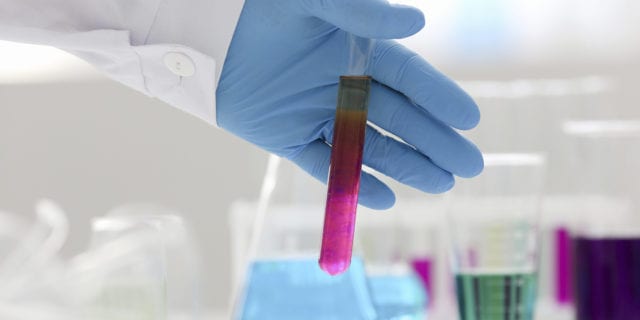John Theurer Cancer Center and Colleagues at Hackensack Meridian Health’s Center for Discovery and Innovation Lead Academic Clinical Research
New Jersey’s largest and most comprehensive cancer program conducts breakthrough research investigations

John Theurer Cancer Center, in collaboration with Hackensack Meridian Health’s Center for Discovery and Innovation (CDI), is involved in several investigations to advance cancer treatment, including:
A new pathway to open up blood cancer treatments – investigative teams found reversing runaway inflammation in the bone marrow could lead to major breakthroughs in treatments for some blood cancers. These findings could ultimately improve cancer treatments for people of advanced age; for example, an adult with acute myeloid leukemia.
The study demonstrates how endothelial (blood vessel lining) cells orchestrate inflammatory stress within the microenvironment of the bone marrow. The scientists demonstrated the function of two connected pathways involved in myelosuppressive injuries (like those caused by chemotherapy), in which bone marrow activity decreases, leading to less blood cell production.
The investigation led to the discovery of a novel protein, Stem Cell Growth Factor Alpha (SCGFa). SCGFa was shown to preserve blood stem cell function and vascular function while simultaneously enhancing hematopoietic recovery and when infused following chemotherapeutic treatments.
“If we infuse patients with SCGFa, we may be able to protect their blood system and allow for rapid regeneration and rejuvenation of their bone marrow,” said Jason Butler, Ph.D., an associate member of the CDI, and the senior author. “This would allow us to potentially give patients higher doses of chemotherapy – and ultimately lead to better outcomes and lower relapse rates.”
Dr. Butler and his laboratory are currently studying the direct effects of SCGF on blood stem cells and how SCGFa may enhance the homing, engraftment, and function of hematopoietic stem cells following bone marrow transplants.
Pancreatic cancer paper – The paper highlighted a treatment protocol in a realistic mouse model of human pancreatic cancer. The tumors in these mice carry the same types of mutations as are found in aggressive human pancreatic cancers. Research findings published in Cancer Research suggest that since some cancer treatments can be undermined by epigenetic changes (altered DNA methylation affecting gene expression) in cancer cells before the treatments are even administered, a worthwhile strategy is to administer an epigenetically-acting drug – which can pave the way for more effective subsequent use of immune-acting cancer treatments, according to lead author and CDI lab director Benjamin Tycko, M.D., Ph.D.
“A one-two punch of changing gene expression, then deploying immune checkpoint inhibitors, shows promise in battling one of the most treatment-resistant types of cancer in preclinical models,” said Dr. Tycko.
The tumor type – pancreatic ductal adenocarcinoma – is among the most deadly cancer types, since it has proven to be stubbornly resistant both to standard chemotherapy and more recent immunotherapies, according to research team member Tamas Gonda, M.D. The researchers’ work continues, with further strategies including adding other epigenetic drugs, and also discovering ways to reduce the number of M2 macrophages to potentially improve the response.
Microbiome and heterogeneity of response to cancer therapies, in collaboration with Michele Donato, M.D., Dr. Noa Biran, M.D. and David Siegel, M.D., Rena Feinman, Ph.D., an associate member of the Institute for Multiple Myeloma and Lymphoma at the CDI, is investigating whether distinct gut bacteria can predict the risk for relapse in patients with high-risk multiple myeloma undergoing autologous stem cell transplantation. In a Breast Cancer Research Foundation sponsored study, Dr. Feinman’s lab is working to identify novel gut and tumor bacteria-associated biomarkers that predict response to neoadjuvant chemotherapy in newly diagnosed triple negative breast cancer patients. This study is being done in collaboration with Dr. Leslie Montgomery (HMH-JTCC), Dr. Lajos Pusztai (Yale Cancer Center) and Dr. Eleni Tsoumis (Georgetown Lombardi Comprehensive Cancer Center). Consortia-IO Microbiome
These studies are made possible through the HMH CDI. The CDI was formally established in May 2019 with a fundamental mission to conduct “science with clinical impact” by translating in real-time insights from molecular and cellular science to improve patient outcomes, especially in cancer and infectious diseases.

